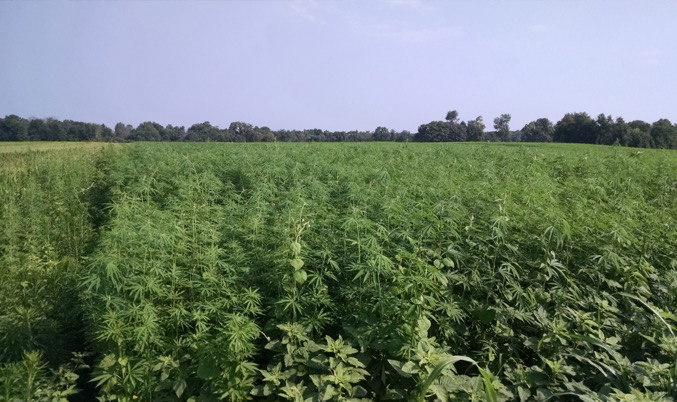FLORENCE – Industrial hemp production could be a viable crop alternative for South Carolina farmers, according to Clemson Cooperative Extension crop and agribusiness agents.

Clemson officials teamed with industrial hemp industry associates for a session at the 2019 S.C. AgriBiz and Farm Expo in Florence about the state’s hemp crop. David DeWitt, Clemson Extension agent and agronomic crops program team member in Lee County, said interest in industrial hemp is increasing in the agricultural community.
“The good news is, we can grow industrial hemp in South Carolina,” DeWitt said. “Our yields were where they needed to be in 2018 and we’re getting ready for 2019.”
Twenty farmers received permits to grow industrial hemp in South Carolina in 2017-2018 as part of a pilot program. Because hemp is a relatively new crop, there are still several steps to take before there are labeled fungicides, herbicides and pesticides such as those afforded traditional crops. Justin Ballew, a Clemson Extension commercial horticulture agent in Lexington County, said biological and cultural practices can be used to control some insects and weeds in hemp. Main insects farmers encountered during the first year of growing hemp in the state included aphids, caterpillars, hemp russet mites, spider mites, stink bugs and thrips. Aphids and spider mites were more of a concern in greenhouses than in fields.
Hemp-based product sales in the United States are projected to reach $1.9 billion by 2022, said Nathan Smith, a Clemson Extension economist. Uses for industrial hemp are immense, including using the fiber to create fabrics, handbags, denim, diapers, socks, shoes and more. Hemp hurds, which come from the woody inner part of the stalks, can be used to create paper, cardboard, packaging materials, building materials, mulch and more. Hemp seeds can be used in foods such as granola and bird seeds. Hemp oil is used to create foods such as salad oils and margarine. The oil also is used to produce printing inks, fuel, soap, shampoo and other personal hygiene products. Cannabinoids, or CBDs, are chemical compounds found in hemp plants and are used to treat some common ailments.
Because hemp is new to South Carolina, Smith said he and other state economists are in the process of creating enterprise budgets for this crop.
“We’re waiting to see what growers get paid,” Smith said. “The lack of labels for fungicides, herbicides and pesticides is another major hurdle we’re going to have to clear before we can create viable budgets. Right now, based on data from eight growers, operating costs appear to range from $8,000 to $13,000 per acre before accounting for labor and machinery costs.”
The growers also invested in irrigation, greenhouses and drying facilities.
Kevin Wyse, a structural engineer from Barnwell, attended the hemp session because he is in the process of applying for permits to grow hemp and wants to learn more about the crop.
“I just closed on 130 acres in November,” Wyse said. “My grandfather was a farmer and I look at this as a way to carry on his legacy. He grew corn, cotton, soybeans and wheat, as well as raised hogs. I plan on growing hemp – it’s a new crop and I believe it will do well.”
Joe Wilkes of Winnsboro is one of 40 farmers who received permits to grow hemp in 2019. Wilkes is from Fairfield County and said he views growing hemp as a way to provide income for local people.
“Fairfield County has a high unemployment rate,” said Wilkes, who is retired after having worked in the construction and nuclear industries. “I would like to use this as an opportunity to help put some people to work. I also would like to use this an opportunity to teach young people about farming and maybe instill a desire in them to enter farming as a profession.”
For more information about the South Carolina Industrial Hemp Program, visit https://www.clemson.edu/extension/industrial-hemp.html.
Get in touch and we will connect you with the author or another expert.
Or email us at news@clemson.edu

